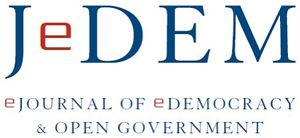Difference between revisions of "Martin Fredriksson, James Arvanitakis (2015) Piracy, Property and the Crisis of Democracy"
| Line 1: | Line 1: | ||
| − | + | [[File: Jedem_compact.jpg | thumbnail | right]] | |
| − | + | == <small>'''Abstract'''</small> == | |
| + | A political battle is being waged over the use and control of culture and information. While media companies and copyright organisations argue for stricter intellectual property laws, a growing body of citizens challenge the contemporary IP-regime. This has seen a political mobilisation of piracy. Pirate parties see themselves as a digital civil rights movement, defending the public domain and the citizen’s right to privacy against copyright expansionism and increased surveillance. Since the first pirate party was formed in Sweden in 2006, similar parties have emerged across the world. This article draws on a study of the culture and ideology of copyright resistance, through interviews with pirate party representatives in Europe and North America. It focuses on challenges to democracy, and the distinction between public and private property and spaces, in the wake of the war on terror and the global financial crisis. | ||
| + | |||
| + | == <small>'''Keywords'''</small> == | ||
| + | |||
| + | Pirate parties, digital activism, participation, resistance, democracy, civil rights. | ||
| + | |||
| + | == <small>'''File'''</small> == | ||
| + | |||
| + | [[File: piracy-property.pdf]] | ||
| − | + | == <small>'''Source'''</small> == | |
| − | + | [http://www.jedem.org/index.php/jedem/index JeDEM - eJournal of eDemocracy and Open Government] | |
| + | |||
| + | == <small>'''Links'''</small> == | ||
| + | |||
| + | '''URL:''' http://www.jedem.org/index.php/jedem/article/view/365 | ||
| − | + | '''Wayback Machine:''' https://web.archive.org/web/20160710171649/http://www.jedem.org/index.php/jedem/article/view/365 | |
| − | |||
| − | [[ | + | [[Category:Library]] |
| − | [[ | + | [[Category:English]] |
| − | [[ | + | [[Category:Austria]] |
| − | [[ | + | [[Category:2015]] |
| − | [[ | + | [[Category:Martin Fredriksson]] |
| − | [[ | + | [[Category:James Arvanitakis]] |
| − | [[ | + | [[Category:eJournal of eDemocracy and Open Government]] |
Latest revision as of 02:01, 30 April 2017
Contents
Abstract
A political battle is being waged over the use and control of culture and information. While media companies and copyright organisations argue for stricter intellectual property laws, a growing body of citizens challenge the contemporary IP-regime. This has seen a political mobilisation of piracy. Pirate parties see themselves as a digital civil rights movement, defending the public domain and the citizen’s right to privacy against copyright expansionism and increased surveillance. Since the first pirate party was formed in Sweden in 2006, similar parties have emerged across the world. This article draws on a study of the culture and ideology of copyright resistance, through interviews with pirate party representatives in Europe and North America. It focuses on challenges to democracy, and the distinction between public and private property and spaces, in the wake of the war on terror and the global financial crisis.
Keywords
Pirate parties, digital activism, participation, resistance, democracy, civil rights.
File
Source
JeDEM - eJournal of eDemocracy and Open Government
Links
URL: http://www.jedem.org/index.php/jedem/article/view/365
Wayback Machine: https://web.archive.org/web/20160710171649/http://www.jedem.org/index.php/jedem/article/view/365
